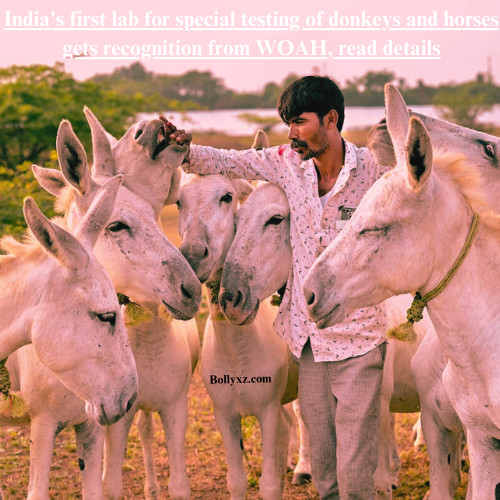In this age of mechanization, donkeys, horses, and mules cannot be ignored. Today, there are some works in hilly and cold areas that are not possible without these animals. Apart from use in trade, the business of buying and selling is worth crores of rupees.
Donkeys, horses, and mules are used not just for one but many works. Especially in horses, the breed is already identified for every work. The horses used in polo are of different breeds, while the horses showing their agility in obstacles are of a different special breed. According to experts, the business of buying and selling donkeys, horses, and mules is worth crores of rupees. But as soon as the news of some specific diseases spreads, this business comes to a complete halt. And the worrying thing is that the report of every lab is not accepted during trade.
But now we have got rid of this problem. The National Research Center on Equines, Hisar (ICAR-NRC Equine) has been recognized by the World Organization for Animal Health (WOAH). Now, this lab in Hisar will be able to test piroplasmosis disease in donkeys, horses, and mules. Research will also be done on this disease. This disease is considered very dangerous for all three types of animals.
Know what is piroplasmosis disease in donkeys and horses.
Equine piroplasmosis is a disease caused by tick-borne protozoan parasites Babesia caballi and Theileria equi. It specifically attacks horses, donkeys, mules, and zebras. This disease not only poses a serious threat to animal health but also causes economic losses due to business closure. The seroprevalence rate of this disease in India is 15 to 25 percent. Whereas in some high-risk areas, it reaches 40 percent. This results in reduced animal productivity, poor health, and restricted movement and export of horses.
Recognizing the need for strict control and prompt treatment, DAHD prioritized NRC Equine as India’s national-level center for equine diseases and the institute developed state-of-the-art treatment equipment for equine piroplasmosis. ELISA based on recombinant antigen, indirect fluorescent antibody test, competitive ELISA for antibody detection and blood smear test, MASP in-vitro culture system, and PCR for antigen detection were developed.
It is the fourth laboratory to receive accreditation from WOAH.
NRC Equine is the fourth laboratory in the animal husbandry sector of India to receive laboratory accreditation from WOAH. Earlier, the College of Veterinary Medicine, Karnataka Veterinary Animal and Fisheries Sciences University, Bangalore has been accredited by WOAH for Rabies, National Institute of Veterinary Epidemiology and Disease Informatics, Bangalore has been accredited for PPR and Leptospirosis disease testing.
According to animal experts, according to the 20th livestock census, there are about 5.5 lakh equines (horses, ponies, donkeys, mules) in India. This population includes about 3.5 lakh horses and ponies, 1.20 lakh donkeys, and 80 thousand mules. The highest number of these are in Uttar Pradesh, Rajasthan, Gujarat, and Haryana.

